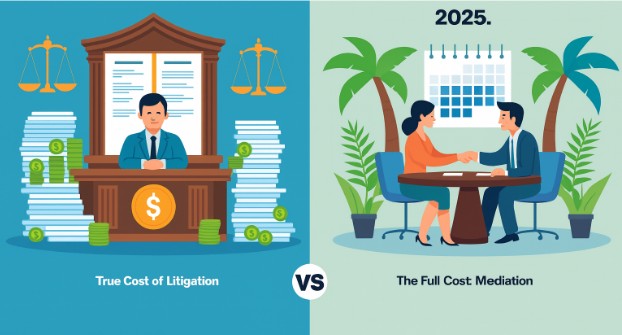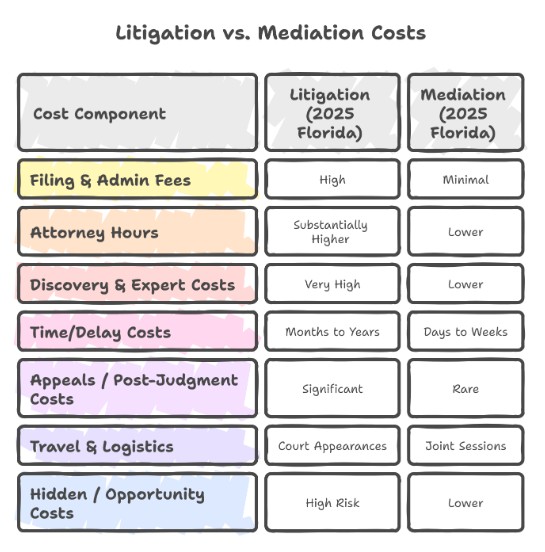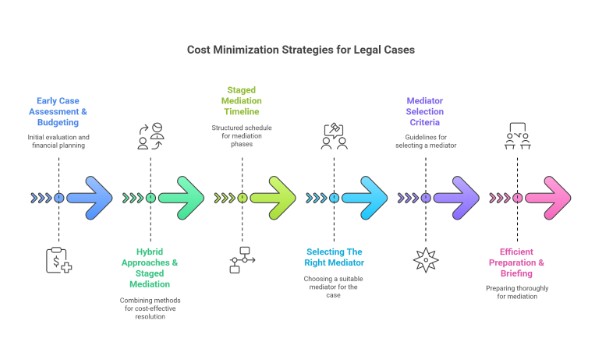

Litigation in Florida can increase costs, time, and client stress. Mediation offers a streamlined, cost-effective alternative — but what do the real numbers say in 2025?
Mediation usually costs between $1,000 and $5,000 total, while litigation often exceeds $15,000 just in legal fees.
Understanding these differences helps families and businesses make more informed decisions about resolving their conflicts.
The costs go way beyond attorney fees. Court costs, filing fees, expert witness expenses, and the time lost to drawn-out disputes pile on hidden expenses that most people just don’t see coming.
Florida’s mediation success rates continue to demonstrate why more people turn to this approach when seeking a faster and more efficient resolution.
Table of Contents
Key Takeaways
- Mediation costs significantly less than litigation, typically saving families and businesses thousands of dollars in legal expenses.
- Hidden costs like court fees, expert witnesses, and lost time make litigation far pricier than you’d think at first glance.
- Mediation’s financial benefits extend beyond savings—preserving relationships and resolving disputes more efficiently also matter.
Why Cost Comparison Matters In Dispute Resolution

When a legal dispute hits, most people feel overwhelmed by the choices. Picking between litigation and mediation can shape your financial future for years.
Financial planning gets critical during these conflicts. It’s important to know what you might spend before you dive in.
Litigation typically incurs higher costs, including attorney hours and court fees. These expenses can quickly spiral out of control.
The hidden costs often catch people off guard. Court battles eat up time and energy you could spend on healing—or building your business.
Key factors to keep in mind:
- Attorney fees and hourly rates
- Court filing costs
- Expert witness expenses
- Time away from work or family
- Emotional stress for everyone involved
Mediation offers a faster, more affordable resolution with less legal red tape. This approach enables people to make informed decisions about their resources.
Business owners feel the pinch in particular. Every hour spent on conflict is an hour not spent growing the business or innovating.
Breakdown Of Costs In Florida Litigation (2025)

Florida litigation incurs a range of costs that can exceed $15,000 to $50,000 or more per party.
Court filing fees, attorney hourly rates, and discovery expenses start the meter running, while delays and appeals can double what you first expected.
Fixed And Variable Court Costs
Florida courts charge specific filing fees depending on the case type and complexity. For example, a circuit court divorce costs $409 to file, while family law modifications come in at $295.
Fixed Court Costs:
- Initial filing fees: $295-$409
- Service of process: $40-$75
- Mediation referral fees: $120
- Final judgment recording: $10
Variable costs depend on the duration and complexity of the case. Motion filings range from $25 to $50 each, and subpoenas cost between $15 and $30 per document.
Court reporters charge $3 to $6 per page for transcripts. Depositions incur an additional $200-$400 per day for reporting services.
Additional Variable Fees:
- Expert witness fees for court testimony
- Certified copy requests
- Emergency motion hearings
- Process server travel costs
These court costs and filing fees are just the starting point before you even hire a lawyer.
Attorney Fees & Hourly Billing
Florida family law attorneys typically charge between $250 and $600 per hour, depending on their experience and location. In Miami and Tampa, rates often exceed $400 per hour, while smaller counties average between $275 and $350.
Most lawyers want a retainer between $3,000 and $10,000. Simple cases might take 20-40 hours. Complex litigation—especially involving business assets or custody disputes—can consume 80 to 150 hours.
Typical Billing Activities:
- Client meetings and phone calls
- Document review and prep
- Court appearances and hearings
- Research and legal writing
- Email correspondence
Attorneys bill in 6-minute chunks. Even a 3-minute phone call gets rounded up. Reviewing documents, sending emails, traveling—it all adds up.
Attorney fees in Florida divorce cases can range from $15,000 to $30,000 per party if the case becomes contested. Sometimes, courts even order one spouse to pay the other’s attorney fees if there’s a big financial gap.
If you’re ready to get started, call us now!
Discovery, Experts & Motion Costs
Discovery allows both sides to gather evidence, but it quickly drives up costs. Document production, depositions, and interrogatories all come with price tags.
Discovery Expenses:
- Depositions: $500-$1,500 per person
- Document production: $200-$800
- Interrogatories: $300-$600
- Medical record requests: $50-$200
Expert witnesses often charge between $200 and $500 per hour. Financial experts, custody evaluators, and appraisers typically require 10 to 20 hours of work.
Child custody evaluations typically range from $2,000 to $5,000. Business valuations typically range from $3,000 to $10,000. Real estate appraisals typically cost between $400 and $800.
Motion practice means more attorney time. Emergency motions require immediate court appearances, and every motion necessitates thorough research, meticulous writing, and potentially, hearings.
Common Motions and Costs:
- Temporary support motions: $1,500-$3,000
- Discovery disputes: $800-$2,000
- Contempt proceedings: $1,200-$2,500
Delay Costs & Opportunity Costs
Florida courts often schedule hearings 2-4 months out. Each delay prolongs attorney involvement and incurs additional charges.
Contested cases that last 12-18 months multiply expenses. Attorney retainers are often depleted and need replenishment. Ongoing discovery keeps the bills coming.
Financial Impact of Delays:
- Extended attorney fees
- Extra court appearances
- More expert involvement
- Lost productivity at work
Emotional costs can hit work performance and family life. Some people even take unpaid leave for court appearances. Career growth may stall during drawn-out cases.
Property values may shift while litigation is ongoing. Business assets can lose value. Investment opportunities slip by as assets get tied up.
The stress and time costs sometimes linger long after the case is over.
Appeal & Post-Judgment Costs
Appeals in Florida typically require new attorney retainers, which usually range from $5,000 to $15,000. Appellate attorneys charge $300 to $500 per hour for their specialized work.
Appeal bonds may be necessary to stop judgment enforcement. These bonds are usually 110% of the judgment plus estimated costs.
Appellate Expenses:
- Notice of appeal filing: $300
- Record prep: $500-$2,000
- Appellate brief writing: $5,000-$10,000
- Oral argument prep: $1,000-$3,000
Post-judgment enforcement keeps costing money. Contempt actions run $1,500-$4,000. Asset discovery can add $2,000 to $5,000.
Modification actions mean new court proceedings and more legal expenses. Changed circumstances, such as job loss or relocation, can trigger this.
Attempting to collect from someone who refuses to pay can result in garnishment costs, asset searches, and enforcement hearings. This process can drag on for years after the first judgment.
Breakdown Of Costs In Florida Mediation (2025)
Florida mediation costs vary depending on the case and the mediator’s experience, with total expenses typically ranging from $1000 to $8,000.
Knowing these numbers helps couples budget and make informed decisions about how to resolve issues.
Mediator Fees & Session Costs
Most Florida mediators charge $150 to $400 per hour. Experienced family law mediators typically charge between $200 and $350 per hour, while newer mediators may charge as low as $100 per hour.
Average Session Costs:
- Initial consultation: $150-$250
- Standard mediation sessions: $300-$800 per 2-hour session
- Half-day sessions (4 hours): $600-$1,400
- Full-day sessions (8 hours): $1,200-$2,800
Simple divorce cases typically conclude within 2 to 4 hours of mediation. If there’s child custody or significant assets, it may take 6-12 hours across several sessions.
Virtual mediation can cut costs by removing travel time and facility fees. Many couples save 15-25% by choosing online sessions.
Some mediators offer flat-fee packages for straightforward divorces. These range from $1,500 to $3,000 and cover all necessary sessions to reach an agreement.
Preparation & Pre-Mediation Costs
Preparing documents can consume a significant portion of pre-mediation expenses. Couples typically need to gather financial statements, asset valuations, and custody paperwork before proceeding.
Common preparation costs include:
- Financial disclosure prep: $200-$500
- Property appraisals: $300-$600 per property
- Business valuations: $2,000-$5,000
- Retirement account valuations: $150-$400
- Child custody evaluations: $1,500-$4,000
Attorney consultation fees for mediation prep usually range between $200 and $500 per hour. Most couples spend two to four hours with their lawyers before mediation even gets underway.
Pulling together tax returns, bank statements, and investment records takes time, but the direct costs are minimal.
Some folks hire paralegals at $50-$100 per hour to organize everything and save themselves the headache.
Pre-mediation coaching sessions help individuals understand the process and prepare emotionally. These are optional, but they cost $100-$200 per hour and can boost mediation success rates.
Settlement Implementation & Follow-Up
Turning a mediated agreement into a legally binding document requires more professional assistance. Most couples require a lawyer to review all documents and assist with court filings after they have settled.
Post-mediation costs typically include:
- Attorney review of agreement: $300-$800
- Legal document drafting: $500-$1,200
- Court filing fees: $409 (standard Florida divorce fee)
- Service of process: $40-$75
Some mediators offer document prep services at cheaper rates than attorneys. That can save couples $200 to $500 on drafting costs.
Notarization and witness requirements add a little more—usually $10-$25 per document. Most settlements need notarized signatures on several forms.
If you require follow-up mediation sessions to refine the agreement, you can expect to pay the same hourly rates as before. This happens when things change after the settlement.
If you’re ready to get started, call us now!
Additional Costs In Complex Cases
High-asset divorces and complex custody cases often incur more expenses than standard mediation. These situations require specialized experts and typically take longer to resolve.
Complex case additions may include:
- Forensic accounting: $3,000-$10,000
- Child psychologist consultations: $200-$400 per hour
- Specialized asset appraisals: $500-$2,500 per item
- Expert witness fees: $300-$600 per hour
International asset cases require additional legal research and paperwork, which can add $2,000 to $5,000 to the total bill.
Business ownership disputes often require specialist business mediators charging $400-$600 per hour—they know their stuff when it comes to valuation and division headaches.
In domestic violence cases, mediators may use shuttle mediation, keeping parties in separate rooms. This approach doubles facility costs and typically prolongs sessions.
Complex mediation cases still run significantly cheaper than litigation, which often exceeds $15,000 per person if things become really complicated.
Side-by-Side Comparative Table: Litigation vs. Mediation Costs

| Cost Component | Litigation (2025 Florida) | Mediation (2025 Florida) |
| Filing & court administrative fees | High (varies by county & court level) | Minimal or none (if mediation is private) |
| Attorney billable hours | Substantially higher (discovery, motions) | Lower (focused preparation + session time) |
| Discovery & expert costs | Very high in complex cases | Lower, sometimes zero if parties waive |
| Time/delay costs | Months to years of delay | Often resolved in days to weeks |
| Appeals / post-judgment costs | Significant in contested outcomes | Rare (settlement avoids appeals) |
| Travel & logistics | Court appearances, trial days | Joint sessions, often local or virtual |
| Hidden / opportunity costs | High risk of wasted capital and business impact | Lower, faster decisions reduce carry cost |
Factors That Influence Cost Differences
What makes mediation or litigation more expensive in Florida? A few big factors stand out, and the complexity of the case usually tops the list.
Case Complexity really drives costs. Simple disputes might only cost a few thousand dollars to mediate. Complex cases like divorce or contract fights can skyrocket into six figures if you end up in court.
Time Requirements can be wildly different. Mediation typically concludes within weeks or months. Litigation?
That can drag on for years, with attorney fees and court costs accumulating the entire time.
| Factor | Mediation Impact | Litigation Impact |
| Attorney Hours | Limited sessions | Extensive preparation |
| Discovery Process | Minimal | Comprehensive |
| Court Appearances | None required | Multiple hearings |
Discovery and Preparation create the most significant cost gaps. Litigation demands tons of prep—discovery, motions, trial strategy—the works. All that means more attorney hours.
The number of Parties also changes the math. More people in mediation means more sessions, but in court, every extra defendant means more depositions and motions. The costs just keep multiplying.
Geographic Location matters, too. Lawyers in Miami or Orlando usually charge more than those in smaller towns. Even court filing fees can shift depending on the county.
Willingness to Compromise is huge. If both sides are open to negotiation, mediation typically wraps up more quickly.
However, if someone digs in their heels, legal bills can spiral as cases drag on through multiple hearings.
If you’re ready to get started, call us now!
Risks And Cost Overruns In Mediation You Must Consider
Although mediation typically costs significantly less than litigation, individuals can still incur unexpected expenses. Some of these hidden costs really catch folks off guard.
Failed Mediation Costs
If mediation falls apart, you lose whatever you spent up front and then have to pay for litigation on top of that. It’s a double whammy that most people just don’t see coming.
Multiple Session Expenses
Complicated cases often require multiple mediation sessions. Each extra meeting adds to the bill, so it’s smart to budget for more than one round of talks.
Key Risk Factors Include:
- Preparation costs – Attorney time for getting ready
- Document review – Legal fees for checking evidence
- Expert witnesses – Paying for professional opinions
- Travel expenses – Going to far-off mediation locations
- Lost productivity – Time away from work or business
Enforceability Concerns
Mediation agreements don’t always pack the same punch as court judgments. If someone ignores the deal, you may need to take further legal action to enforce it, which will incur additional costs in the future.
Incomplete Resolutions
Sometimes mediation only solves part of the problem. The rest may still require a judge, so you will pay for both processes instead of just one.
Power Imbalances
If one side has way more resources, mediation can feel unfair. The person with less might settle for a bad deal just to avoid court costs, which can sting for years.
Strategic Tips To Minimize Costs (For Lawyers & Clients)

Attorneys can proactively reduce cost exposure by smart planning, choosing the right mediator, and structuring the process wisely.
Early Case Assessment & Budgeting
Lawyers should thoroughly evaluate the case within the first 30 days. Deciding early whether mediation or litigation is the best fit can make all the difference for the client’s wallet.
Key Assessment Factors:
- Strength of legal claims and defenses
- What evidence is available, and what still needs digging up
- Client’s real goals—money, relationships, time, whatever matters most
- What the other side is likely to do
Building a detailed budget at the start helps avoid nasty surprises. Lawyers should lay out realistic cost ranges for both mediation and litigation. Effective litigation cost management ensures that resources are not wasted.
Clients perform better when lawyers clearly explain how fees work from the outset. Hourly rates, retainers, expert witness costs—all of it should be on the table.
That kind of transparency fosters trust and enables everyone to make more informed choices.
Monthly or quarterly budget check-ins keep things from going off the rails. If costs start creeping up, it’s easier to adjust strategies before it’s too late.
Hybrid Approaches & Staged Mediation
Combining mediation with litigation can significantly reduce expenses. Try mediation first. If that doesn’t work, then move to court—but only for what’s left unresolved.
Staged Mediation Timeline:
- Initial mediation – Tackle the main issues
- Limited discovery – Only gather the most important documents
- Second mediation – Work out what’s still hanging
- Targeted litigation – Go to court for the stubborn stuff
Some cases result in partial settlements. That’s fine—settle what you can in mediation and litigate the rest. It narrows the scope and cuts down court costs.
Smart strategies for controlling costs help organizations stay afloat while dealing with tough legal battles.
Early neutral evaluation is another option. A seasoned attorney or retired judge provides a brief case assessment before anyone proceeds with mediation or litigation.
Selecting The Right Mediator
The mediator you pick can make or break your settlement and how long it takes. Mediators who know your type of dispute usually wrap things up faster than generalists.
Mediator Selection Criteria:
- Subject matter expertise – Construction, employment, personal injury, etc.
- Settlement success rate – Don’t be shy, ask for stats
- Communication style – Make sure it fits the group
- Availability – Can they get you in soon?
Mediator fees in Florida are all over the map. The pros may charge $300-800 per hour, but their experience often means you settle faster.
Less experienced mediators charge $150-300 per hour, although their sessions may last longer.
It’s a good idea to interview potential mediators. Ask about their approach, how long sessions typically last, and what their success rate is.
Some mediators offer flat fees for straightforward cases. That gives you a clear price up front and may keep costs lower for simple disputes.
Efficient Preparation & Briefing
Good prep saves time in mediation and makes settlement more likely. Lawyers should gather key documents, witness statements, and conduct their legal research before sessions begin.
Essential Preparation Steps:
- Write up short, clear case summaries
- Figure out realistic settlement ranges
- Identify who’s actually making the decisions
- Prep opening statements
Pre-mediation briefs should stay focused. Long, rambling documents just waste everyone’s time and money. Three to five pages highlighting the key facts, legal issues, and settlement positions usually do the trick.
Technology and automation tools can help legal teams reduce costs without compromising efficiency. Document review software and case management systems make a significant difference in the preparation process.
Clients should actually attend prep meetings. Their take on priorities, limits, and what’s acceptable helps lawyers come up with better strategies.
Scheduling matters, too. Full-day mediation sessions often cost less overall than splitting them up into several half-day sessions, especially when travel and preparation time are factored in.
ROI & Value Beyond Price: Intangibles That Matter
When you’re weighing dispute resolution options, don’t just focus on the direct costs. The difference between costs and value can shape how you make decisions in legal matters.
Business Relationship Preservation
Mediation often helps people keep their working relationships intact. Litigation, on the other hand, often damages or permanently destroys these connections.
It’s a significant advantage when companies can continue to do business together after resolving their disputes.
Time to Resolution Impact
| Process | Typical Timeline | Business Impact |
| Mediation | 2-6 months | Minimal disruption |
| Litigation | 1-3 years | Extended uncertainty |
Executive Focus and Productivity
Litigation consumes a significant amount of management’s time, including depositions, document reviews, and trial preparation. Leaders often get pulled away from their primary business objectives.
Mediation usually takes less executive time. Most teams would rather focus on growth and daily operations than legal headaches, wouldn’t they?
Market Reputation Considerations
Public court records can hurt a company’s reputation. Lawsuit coverage in the media can shake customer trust and lower employee morale.
Mediation stays confidential. By resolving things quietly, companies sidestep negative attention and protect their market standing.
Stress and Emotional Costs
The hidden costs of litigation include stress for employees and leadership. Court battles crank up workplace anxiety and tension.
Mediation, by contrast, is a less adversarial approach. Folks going through it usually feel less stressed.
Future Legal Positioning
Litigation sets public precedents that can box you in during future negotiations. Competitors can study court decisions and use them to their advantage.
Mediated agreements enable parties to create solutions without leaving a public legal record behind.
Conclusion
The financial gap between mediation and litigation in Florida was quite broad in 2025.
Mediation typically costs between $1,500 and $4,000, while litigation can range from $15,000 to over $50,000.
Time savings matter too. Mediation often concludes in just weeks or a few months, but court cases can take years. They might drag on for years.
Families facing divorce or business disputes should consider their own unique situations. If there are complicated assets or significant conflicts, that could change which approach makes sense.
Florida mediation studies show that mediation often outperforms litigation in terms of speed, cost, and outcomes when individuals seek to maintain a relationship. If you care about staying on good terms, mediation’s probably worth a look.
Key considerations include:
- Budget constraints and what resources you actually have
- Complexity of the legal issues
- Relationship preservation—do you want to keep talking after this?
- Timeline—how fast do you need a resolution?
Legal professionals can help you determine which option is the best fit. Sometimes, starting with mediation makes sense, and if that doesn’t work, you can consider litigation.
The choice between mediation and litigation can have a significant impact on your finances. It affects stress, time, and how you interact with the other party in the future.
The Mediation Group, Inc. helps families find common ground with family mediation that focuses on fairness and closure. Take the first step toward resolution—contact us to schedule.
Contact Us Today For An Appointment
Frequently Asked Questions
What is the difference between court-ordered and private mediation in Florida?
A judge mandates court-ordered mediation, while the parties voluntarily choose private mediation. Court-ordered mediation follows court rules and schedules, while private mediation offers more flexibility and allows for a choice of mediator.
Is court-ordered mediation mandatory in Florida?
Yes. Florida courts often require mediation in divorce, custody, civil, and foreclosure cases before trial. Refusing to attend without a valid reason may result in court penalties.
Who pays for mediation in Florida?
In court-ordered mediation, fees may be set by the court or shared by the parties. In private mediation, parties typically negotiate the costs, which are usually split unless otherwise agreed.
How much does private mediation cost in Florida?
Private mediators typically charge between $200 and $500 per hour in Florida. Costs depend on the case’s complexity, the mediator’s experience, and whether multiple sessions are required.
Can parties choose their mediator in court-ordered mediation?
Usually no. Court-ordered mediators come from a certified roster. In private mediation, parties select a mediator with the expertise and style they prefer.
Are agreements from mediation legally binding in Florida?
Yes. Once both parties sign a mediation settlement, it becomes a binding contract. Courts can approve and enforce it like any other judgment.
Is mediation faster than litigation in Florida?
Yes. Mediation can resolve disputes in days or weeks, while litigation often takes months or years due to court delays, motions, and appeals.
When should an attorney recommend private mediation over court-ordered mediation?
Attorneys often recommend private mediation for high-asset divorces, complex business disputes, or cases requiring specialized knowledge, privacy, and scheduling flexibility.